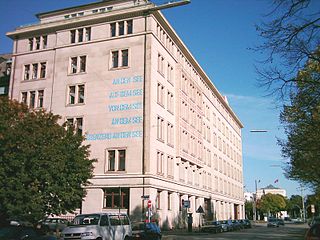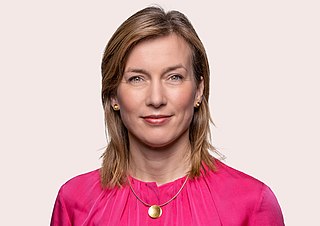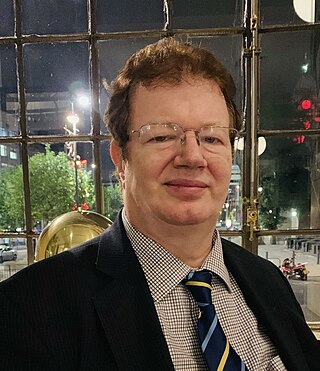
A think tank, or policy institute, is a research institute that performs research and advocacy concerning topics such as social policy, political strategy, economics, military, technology, and culture. Most think tanks are non-governmental organizations, but some are semi-autonomous agencies within government, and some are associated with particular political parties, businesses or the military. Think tanks are often funded by individual donations, with many also accepting government grants.

Foreign policy, also known as external policy, is the set of strategies and actions a state employs in its interactions with other states, unions, and international entities. It encompasses a wide range of objectives, including defense and security, economic benefits, and humanitarian assistance. The formulation of foreign policy is influenced by various factors such as domestic considerations, the behavior of other states, and geopolitical strategies. Historically, the practice of foreign policy has evolved from managing short-term crises to addressing long-term international relations, with diplomatic corps playing a crucial role in its development.

Stockholm International Peace Research Institute (SIPRI) is an international institute based in Stockholm. It was founded in 1966 and provides data, analysis and recommendations for armed conflict, military expenditure and arms trade as well as disarmament and arms control. The research is based on open sources and is directed to decision-makers, researchers, media and the interested public.

The School of International and Public Affairs (SIPA) is the international affairs and public policy school of Columbia University, a private Ivy League university located in Morningside Heights, Manhattan, New York City. SIPA offers Master of International Affairs (MIA) and Master of Public Administration (MPA) degrees in a range of fields, as well as the Executive MPA and PhD program in Sustainable Development.
The International Strategic Research Organization is an independent think-tank established in 2004. It pursues interdisciplinary studies on national and international political, economic and security issues.
Dr. Randall Caroline Forsberg led a lifetime of research and advocacy on ways to reduce the risk of war, minimize the burden of military spending, and promote democratic institutions. Her career started at the Stockholm International Peace Research Institute in 1968. In 1974 she moved to Cambridge, Massachusetts to found the Institute for Defense and Disarmament Studies (IDDS) as well as to launch the national Nuclear Freeze campaign.

David M. Malone, born in 1954, is a Canadian author on international security and development, as well as a career diplomat. He is a former president of the International Peace Institute, and a frequently quoted expert on international affairs, especially on Indian Foreign Policy and the work of the UN Security Council. He became president of the International Development Research Centre in 2008 and served until 2013. On 1 March 2013, he took up the position of UN Under-Secretary-General, Rector of the United Nations University, which he fulfilled until 28 February 2023.

The German Institute for Global and Area Studies, also known as GIGA, is a German research institute. It analyses political, economic, and social developments in Africa, Asia, Latin America, as well as the Middle East. It combines its analysis with comparative research on international relations, development and globalisation, violence and security, and political systems. GIGA researchers are sought after by policymakers to advise Germany's Federal Foreign Office, members of Parliament and other branches of the German federal government. The institute is based in Hamburg and has an office in Berlin.

Yan Xuetong is a Chinese political scientist and serves as a distinguished professor and dean of the Institute of International Relations at Tsinghua University. Yan is one of the major Chinese figures in the study of international relations (IR). He is the founder of 'moral realism', a neoclassical realist theoretical paradigm in IR theory. His moral realist theory is based on political determinism.
Yezid Sayigh is a Palestinian academic. He is a senior fellow at the Carnegie Middle East Center in Beirut, Lebanon. Previously, he was a professor of Middle East Studies at the Department of War Studies at King's College London, a member of the Academic Board of the Gulf Research Center, and a member of the board of trustees of the Palestinian Center for Policy and Survey Research (PCPSR). From 1994 to 2003, he was the assistant director of studies at the Centre of International Studies at Cambridge University. Sayigh also headed the Middle East Research Programme of the International Institute for Strategic Studies (IISS) in London from 1998 to 2003. Sayigh was a negotiator of the 1994 Gaza–Jericho Agreement between the Palestine Liberation Organisation and Israel. He headed the Palestinian delegation to the Multilateral Working Group on Arms Control and Regional Security (1992-1994), and was a MacArthur Scholar and Research Fellow at St Antony's College, Oxford (1990-1994). From 2005 to 2006, Sayigh was a visiting professor at the faculty of Political Studies and Public Administration at the American University of Beirut.

The University of Haifa is a public research university located on Mount Carmel in Haifa, Israel. Founded in 1963, the University of Haifa received full academic accreditation in 1972, becoming Israel's sixth academic institution and the fourth university. The university has the largest university library in Israel. As of 2019, approximately 18,000 students were enrolled at the University of Haifa. Among Israeli higher education institutions the University of Haifa has the largest percentage (41%) of Arab-Israeli students.

The George C. Marshall European Center for Security Studies is a bi-national United States Department of Defense and Federal Ministry of Defence (Germany) security and defense studies institute. When the Marshall Center was founded in 1993, its mission was to create a more stable security environment by advancing democratic institutions and relationships, especially in the field of defense; promoting active, peaceful, security cooperation; and enhancing enduring partnerships among the nations of North America, Europe, and Eurasia. As of Oct. 1, 2014, the Marshall Center's regional mission changed to a transnational one based on an Office of the Secretary of Defense directive to change from a European to a global participants' base.

Security studies, also known as international security studies, is an academic sub-field within the wider discipline of international relations that studies organized violence, military conflict, national security, and international security.
The Mother's Service Society is a non-governmental, educational and social science research institute established at Pondicherry, India in 1970. MSS conducts research on a wide range of activities related to social and economic development, social science research, education and public policy formulation. The Society’s current research activities focus on social development theory, economics, employment, business management, agricultural development, alternative education, global governance, peace & security, literary criticism, psychology and applied spirituality based on a conceptual framework derived from theory of creation and evolution of consciousness propounded by Indian philosopher Sri Aurobindo. MSS is recognized as a Center of Excellence of the World Academy of Art & Science.
The Fletcher School of Law and Diplomacy is the graduate school of international affairs of Tufts University, in Medford, Massachusetts. Fletcher is one of America's oldest graduate schools of international relations. As of 2017, the student body numbered around 230, of whom 36 percent were international students from 70 countries, and around a quarter were U.S. minorities.

J. Peter Burgess is a philosopher and political scientist. He is Professor and Director of the Chair of Geopolitics of Risk at the Ecole Normale Supérieure, Paris. He is series editor of the Routledge New Security Studies collection. His research and writing concern the meeting place between science, culture and politics in particular in Europe, focusing most recently on value theory and digital technologies. He has published 18 books and over 100 articles in the fields of philosophy, political science, gender studies, cultural history, security studies and cultural theory. He has contributed to research and educational policy in Norway, France, Poland and the European Commission. In addition, he has developed and directed a number of comprehensive collaborative research projects with Norwegian and European partners.
The Partnership for Peace Consortium is a network of over 800 defense academies and security studies institutes across 60 countries. Founded in 1998 during the NATO Summit, the PfPC was chartered to promote defense institution building and foster regional stability through multinational education and research, which the PfPC accomplishes via a network of educators and researchers. It is based at the George C. Marshall European Center for Security Studies in Garmisch-Partenkirchen, Germany. According to the PfPC Annual Report of 2012, in 2012 eight hundred defense academies and security studies institutes in 59 countries worked with the PfPC in 69 defense education/defense institution building and policy-relevant events. The Consortium publishes an academic quarterly journal CONNECTIONS in English and Russian. The journal is run by an international Editorial Board of experts and is distributed to over 1,000 institutions in 54 countries.

The existence of pacifism in Germany has changed over time, with the consistent feature of having diverse groups with a shared belief in an opposition to participating in war. These movements both individually and collectively, have historically been small in their numbers and have not been well organised. With a culture of war in the early history of Germany, pacifism was not a culturally significant group. This was driven by the government as they attempted to use the media in order to promote the expansion of Germany as a growing empire. The exception to this is during the Cold War with the Bonn demonstration with a large turnout of around 300,000 people. Christian peace groups have been the most consistent groups within the classification of pacifists as an opposition to violence is a key part of their faith. The size, whilst remaining small varies over the history of the Federal Republic of Germany. The reception from the public regarding pacifists also changes depending on the historical period.

Siemtje Möller is a German teacher and politician of the Social Democratic Party (SPD) who has been serving as a member of the Bundestag from the state of Lower Saxony since the 2017 elections.

Christoph Hartmut Bluth is a professor of international relations and security at the University of Bradford.













